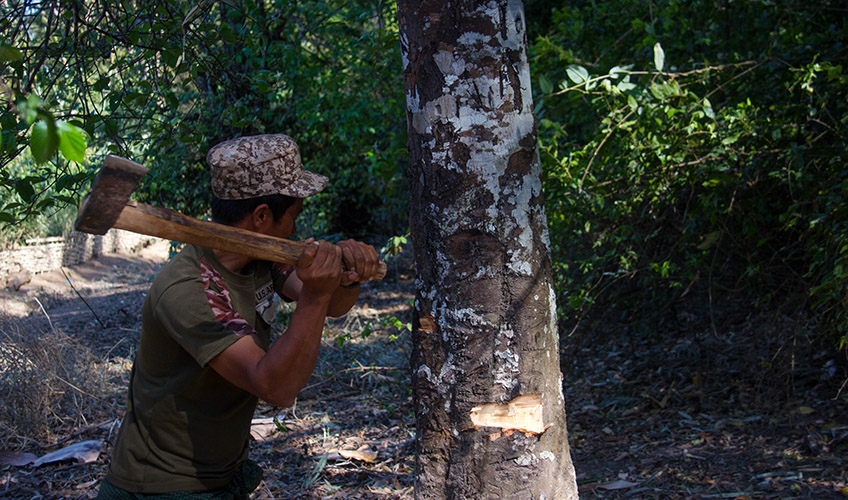Reforming Myanmar’s forest governance from roots to branch
Illegal logging harms communities across Myanmar that are dependent on the forest for their livelihood. Tales of such harm are abundant and heartbreaking.

“The forest is the source that we rely on, for food, living, medicine, for travelling,” a community leader tells me in a group discussion. His community has been living for decades in the Bago Yoma Forest area, once the source of much of the fabulous teak Myanmar is famous for, but now so depleted that the government enacted a 10-year logging ban to preserve what is left. His community has been displaced by conflict multiple times over the years, eking out a living through traditional ‘shifting cultivation’ in what is officially a reserved area.
Sitting around a table sipping tea, the group exchange their stories: A young Asho Chin woman from the west of Myanmar is active in a youth network, which tries to stop illegal logging in her area. She and her family have faced threats for the perceived interference with illegal logging. A man from Bago Yoma agrees that it is easy to get killed if you confront gangs of illegal loggers. A community leader from Shan state in the north of Myanmar, dressed in customary black cotton Pa-O loose trousers and jacket, reports problems with securing official land or forest community registration documents, while also being unable to fend off illegal logging by armed groups. They have travelled from different areas of Myanmar to participate in the group discussion which informs International Alert’s new research report, ‘Forest law enforcement governance and trade in Myanmar: A conflict-sensitivity analysis‘.
The Ministry of Natural Resources, Environment and Conservation has intensified efforts to confront illegal logging and the illegal timber trade. The amount of illegal timber confiscated by the government has increased exponentially: from K168.5 million worth of timber (equivalent to circa 122,400 USD) in 2013, to K9.6 billion (ca 6.98 million USD) seized between January to August 2017) alone. Yet the overall scale of illegal timber is suspected to be far higher.
Myanmar is rich in natural resources, but its famous forest resources are dwindling rapidly. Since 1990, more than a quarter of Myanmar’s total forest cover has been lost, a rate that is estimated to be the third-highest deforestation rate globally. Yet forests are estimated to contribute to the livelihoods of roughly 80 percent of Myanmar’s population, especially those living in poor, marginalised, and conflict-affected areas. Most remaining natural forests in Myanmar are situated in the borderlands, particularly along those of Thailand and China. These areas have seen over sixty years of armed conflict between numerous armed groups and the state, partly motivated by political, economic, and social grievances relating to natural resource management.
Myanmar is in the middle of a precarious, and lengthy process of trying to negotiate peace after six decades of internal armed conflict. At the same time, it is in transition from military rule to a more democratic form of governance. A key issue in the democratic transition and peace process are questions about the future governance of Myanmar’s valuable natural resources, including teak, rosewood, and other valuable timber species that are predominately found in conflict-affected areas of the country.
The country is also currently preparing for negotiations with the European Union (EU) for a Forest Law Enforcement, Governance and Trade Voluntary Partnership Agreement (FLEGT VPA). Since 2003, the EU’s FLEGT Action Plan has sought to reduce illegal logging by strengthening sustainable and legal forest management, improving governance and promoting trade in legally produced timber. The benefits of such an agreement for Myanmar would be to increase access to European markets for its timber exports, to support forest governance reform and increase revenue collection from the timber sector.
In a context as complex as Myanmar, any discussions about governance arrangements for natural resources such as a VPA bring opportunities to contribute towards a peaceful future, but they could also risk unintentionally exacerbating deep-rooted grievances. Additionally, the ongoing tensions and conflict dynamics in the country will influence the process of negotiating the VPA. It is essential to recognise and take into account this two-way interaction between conflict and the VPA process; this is at the crux of a conflict-sensitive approach. Some key issues in forest governance reform and illegal logging in Myanmar need to be addressed in order to ensure that forest resources are governed in a way that helps contribute to peace. These include the political economy of timber, illegal logging, community land and forest rights, and gender.
International Alert’s report draws on examples from Bago Yoma, Magwe and Pa’O Self-Administered Zone to illustrate the links between access to land rights, displacement and conflict. It further draws on a case study from conflict-affected Kachin state, where the Nyein Foundation supports people to protect their land, forest and water resources through community forestry. The report calls for a peacebuilding approach that will improve governance and help forest-dependent communities tackle illegal logging. This should happen through inclusive dialogue between all the stakeholders (such as through the platforms envisaged for a VPA process) and increased community participation, in addition to the formal structures of the political dialogue. It is vital that the full range of stakeholders, including women, youth, and rural citizens from all ethnicities, can play a meaningful role in this.




